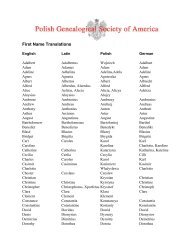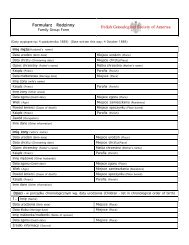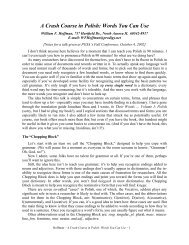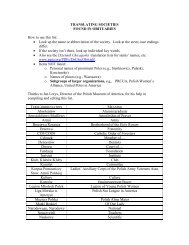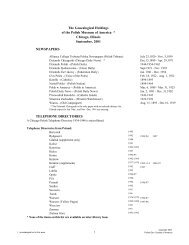Rodziny - Polish Genealogical Society of America
Rodziny - Polish Genealogical Society of America
Rodziny - Polish Genealogical Society of America
Create successful ePaper yourself
Turn your PDF publications into a flip-book with our unique Google optimized e-Paper software.
Moikrewni.pl—A Review <strong>of</strong> a <strong>Polish</strong> <strong>Genealogical</strong> Web Sitewith Surname MappingRobert P. Sliwinski, M.S., e-mail <strong>Genealogical</strong> Web sites designed forPoles are becoming fashionable thesedays, because <strong>of</strong> an emerging interestin family history in Poland. One recentlydeveloped site catering to <strong>Polish</strong>citizens and allowing them to createfamily trees online is www.moikrewni.pl (Figure 1). This site, written in <strong>Polish</strong>,has a unique feature that may alsobenefit <strong>Polish</strong>-<strong>America</strong>n genealogists:its surname mapping.The very existence <strong>of</strong> this site is aninteresting development because, forthe longest time, <strong>Polish</strong> citizens werevery private and did not like providingany personal information online. Sitesthat do give such information are protected,and you need to register to buildyour tree. There are, however, typicallysome features that are available to allwithout registering.In <strong>Polish</strong>, moi krewni (pronounced mo´yeekrev´-nee) means “my relatives.” Thesite’s title, therefore, uses appropriate <strong>Polish</strong>words to describe its theme.Worth noting, however, is the fact thatthis site is just one <strong>of</strong> a family <strong>of</strong> genealogicalWeb sites created by OSN Online SocialNetworking GmbH, based in Hamburg, Germany.Similar sites were designed for otherlanguages, including English, German,Italian, Portuguese, Spanish, and BrazilianPortuguese. The English version, http://www.itsourtree.com/, is very similar to the otherWeb sites, but there are slight differencesbetween the various language versions.Moikrewni uses the basic “let’s build afamily tree” idea as its starting point. Additionally,it provides a forum, contact information,and a section regarding the company’spolicies. As I said, though, the featuremost valuable for <strong>Polish</strong>-<strong>America</strong>ns is the“Mapa nazwisk” or “surname map” at http://www.moikrewni.pl/mapa/. Mapping <strong>of</strong> surnamesin current-day Poland can potentially be auseful tool to locate lost relatives in the oldcountry. It is especially useful for uncommonsurnames.Remember, however, that the site isgeared toward the <strong>Polish</strong> speaker, and aname you type into the “Mapa nazwisk” boxcould be only partially correct. The <strong>Polish</strong>6 <strong>Rodziny</strong>, Spring 2008Figure 1. Home page <strong>of</strong> www.moikrewni.pl (all screen capturesused with permission <strong>of</strong> the Moikrewni webmaster).diacritical marks are very important on thissite, and the database may contain numerous,slightly different variants <strong>of</strong> surnameswith diacritical marks. For instance, if youtype in Sliwinski in English and click on thebutton that says “Szukaj” (Search), you willget a map for Sliwinskis in Poland; but thismap will be misleading and incomplete.In <strong>Polish</strong> the standard spelling <strong>of</strong> thisname is Śliwiński, with acute accents overthe s and n. Variant spellings <strong>of</strong> the nameinclude Śliwinski and Sliwiński. To illustrate,a search for Sliwinski tells you that as<strong>of</strong> 2002 there were nine <strong>Polish</strong> citizens whowere listed under that name in the database<strong>of</strong> PESEL (a <strong>Polish</strong> government agency)from which these figures were compiled.There were 31 entries for Śliwinski and 119for Sliwiński. A search for Śliwiński, on theother hand, shows you there were 8,955Poles who spelled it that way. The diacriticalmarks make a difference!What’s more, Poles use feminine forms<strong>of</strong> many surnames, including those typicallyending in -ski, -cki, -zki, and -ny. Thestandard feminine form is Śliwińska, and9,570 <strong>Polish</strong> citizens went by that formas <strong>of</strong> 2002—not something you’d want tooverlook. The variants Sliwinska, Śliwinska,and Sliwińska, though not technically correctby <strong>Polish</strong> spelling rules, should not be



